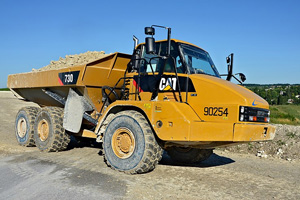

Not All Courses Are Created Equal (And Some Could Hurt Your Chances)
You could spend $3,000 on a civil machinery course and walk away with nothing but a PDF and a whole lot of regret.
We’ve seen it too many times, students enrolling in courses that look slick on the surface but fail to deliver the essentials. No real machines. No practical training. No clue how to handle themselves on a job site.
The truth? The civil machinery training industry is booming. But behind the marketing, it’s messy. With so many options out there, it’s easy to fall for a program that sounds impressive but leaves you totally unprepared for real work.
Let’s break down what most courses get wrong, and how to make sure you’re choosing one that actually sets you up for success.
Problem #1: Many Courses Are Outdated
In a world where GPS-guided graders and 100-tonne dump trucks are the norm, some training providers are still teaching on outdated gear, or worse, on simulators and in static yards with no moving parts.
Here’s the problem: employers aren’t hiring people to sit in classrooms. They’re hiring people who can walk onto a site and operate modern, mine-spec machinery safely and confidently.
That’s why high-quality providers, like My Solution Training (MST), focus on the real deal: one-on-one training with full-size machines like CAT 730 Moxy trucks, 20-tonne excavators, and front-end loaders, all on a simulated mine site in Ipswich that mimics live conditions.
the real deal: one-on-one training with full-size machines like CAT 730 Moxy trucks, 20-tonne excavators, and front-end loaders, all on a simulated mine site in Ipswich that mimics live conditions.
If your course doesn’t reflect the real world, your skills won’t either.
Problem #2: “Certification” Doesn’t Always Mean Qualified
A certificate might look good on your wall, but if it’s not nationally recognised or backed by a Registered Training Organisation (RTO), it won’t get you onto a job site.
Many budget or online-only programs offer certificates that aren’t accredited. These might tick a box for attendance, but they won’t meet industry or legal requirements. You could finish the course, only to find out you’re not actually qualified to operate anything.
Here’s what to look for:
- An RTO number (MST operates under Infront Training, RTO No. 31137)
- RII-coded units of competency, the standard for machinery operation in Australia
- Face-to-face assessments on real equipment
Anything less? Walk away.
Problem #3: No Seat Time = No Site Confidence
You can’t learn to drive a 20-tonne excavator by watching videos.
And you definitely can’t walk into a high-pressure site environment without hands-on experience. This is where many courses fail completely, they focus on theory without giving students the opportunity to operate real machinery under real conditions.
At MST, students are trained one-on-one with experienced instructors on a fully equipped simulated mine site. They practise everything from radio call-outs and traffic management to reversing massive haul trucks on uneven terrain.
Because let’s face it: the only way to feel confident in the cab is to get in the cab.
What a Great Civil Machinery Course Actually Includes
If you’re serious about starting a career in civil construction or mining, this is what your course should include:
- Live training on actual equipment, not just classroom time
- Access to multiple machines: excavators, dump trucks, Moxys, dozers, front-end loaders
- Small group sizes so you’re not just a number
- Experienced, patient instructors who’ve worked in the industry
- A training site that reflects real conditions, not a backyard paddock
- Job-readiness support: resume building, interview prep, and actual job leads
That’s exactly what MST delivers, and it’s why so many of their graduates find work fast.
Signs You’ve Found the Right Fit (Your Checklist)
Use this as your filter when comparing civil machinery courses:
✔️ Nationally recognised certification (RII units)
✔️ Registered Training Organisation (RTO)
✔️ Training on a simulated or active worksite
✔️ One-on-one instruction or small class sizes
✔️ Hands-on time with multiple types of machinery
✔️ Post-course job support
If a course ticks all those boxes, you’re not just learning, you’re preparing to work.
Don’t Waste Time or Money – Learn from the Right People
The good news? You don’t need to spend more, you just need to spend smarter.
A great civil machinery course doesn’t just hand you a certificate. It gives you skills, confidence, and a clear pathway into the workforce.
The right course doesn’t just teach you machines. It builds your future.
Coming Up in Part 5:
In our next article, we’ll take a close look at a course that checks all these boxes, and show how it can take you from total beginner to job-ready faster than you might think.
